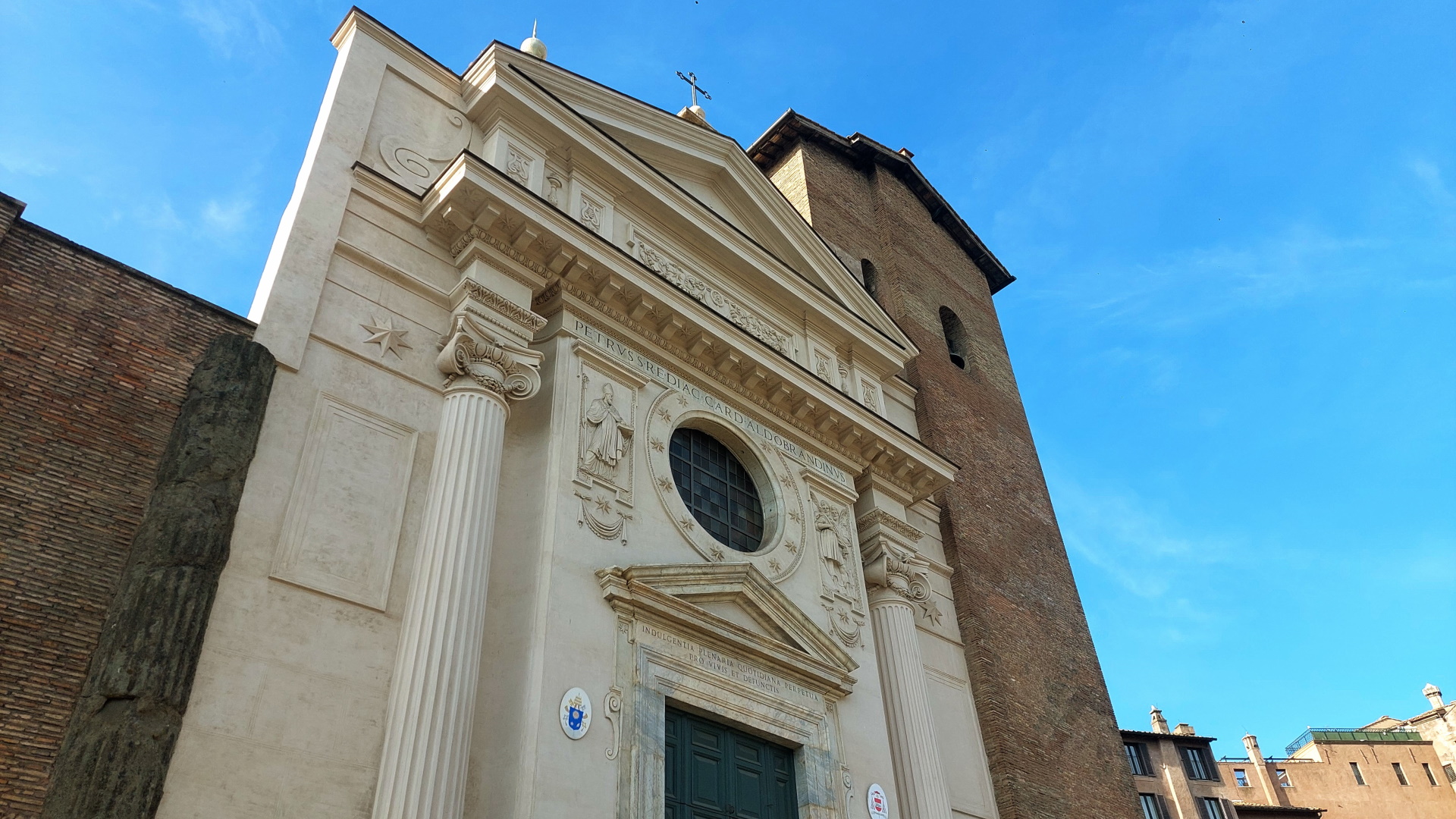
L'église médiévale de San Nicola in Carcere se dresse dans la zone de l'ancien Forum Olitorio, à l'endroit où, à l'époque de la République romaine, se trouvaient trois temples, transformés en prison au Moyen Âge (d'où le nom « in carcere », « en prison »).
Construite en 1128 (comme rappelé par l'inscription sur la façade), elle fut dédiée à saint Nicolas, car la communauté grecque particulièrement dévouée au saint vivait dans cette région. La petite place du Forum Olitorio, avec au centre les trois temples de Janus, de Spes (Espérance) et de Junon Sospita, était utilisée comme marché aux herbes et aux légumes.
L'église fut presque entièrement reconstruite en 1599 par l'architecte Giacomo Della Porta. Rénovée et décorée à nouveau sous le pontificat du pape Pie IX en 1865, elle fut dégagée en 1932 des bâtiments qui lui étaient adossés, afin de mettre en valeur les vestiges des anciens temples.
La basilique respecte largement les canons architecturaux utilisés pour la construction des anciennes églises romaines : les trois nefs sont divisées par quatorze colonnes, différentes par leur matériau et leurs dimensions, toutes provenant d'anciens temples, qui expriment néanmoins une harmonie admirable. À l'intérieur, on peut admirer les magnifiques œuvres du Guercino (« Trinité et Anges »), d'Antonio Romano (« Vierge à l'Enfant ») et de Lorenzo Costa (« Ascension »).
Les trois temples sont encore partiellement visibles aujourd'hui, car ils ont été intégrés à l'église. Le temple sud, de style dorique, peut-être dédié à l'Espérance, était le plus petit. Construit pendant la Première guerre punique, il fut restauré et reconstruit à plusieurs reprises : en 212 avant J.-C., au début du Iᵉʳ siècle avant J.-C., à l'époque augustéenne et à l'époque adriénienne. La cella destinée au culte était entourée de colonnes, dont six sur la façade, en travertin stuqué. Certaines des colonnes latérales, insérées dans le mur gauche de l'église, sont encore visibles aujourd'hui.
Au centre, entre deux temples, exactement au-dessus de l'église, se trouve peut-être le temple le plus récent et le plus grand des trois. Il était hexastyle, périptère, de style ionique, avec une triple rangée de colonnes à l'avant et une double rangée à l'arrière. Les vestiges sont visibles dans les sous-sols de l'église, près de l'abside, ainsi que certaines colonnes dans la zone antérieure. Le temple était très probablement dédié à Juno Sospita, Junon protectrice des naissances. Construit au début du IIᵉ siècle avant J.-C. par C. Cornelius Cetego, il fut reconstruit au début du Iᵉʳ siècle avant J.-C. et restauré à l'époque d'Auguste et d'Hadrien.
Le temple ionique, le plus septentrional des trois, est également le mieux préservé. Il se trouve actuellement à droite de San Nicola in Carcere. Il était hexastyle, périptère, sans colonnade arrière ; sept colonnes sur un côté et deux sur l'autre sont encore bien visibles. De proportions discrètes, il se dressait sur un podium de hauteur moyenne, précédé d'un escalier ; les colonnes avec leurs bases et leurs chapiteaux sont en peperino, l'architrave et la frise en travertin. Le temple était probablement dédié à Janus. Construit à l'époque républicaine par C. Duilio pendant la Première guerre punique, il fut reconstruit au début du Ier siècle av. J.-C., puis restauré à l'époque d'Auguste, de Tibère et d'Hadrien.
Informations
For the timetable of the masses and visiting conditions, please consult the contacts.
 Condividi
Condividi
Location
Pour connaître tous les services d'accessibilité, visitez la section Rome accessible.











































